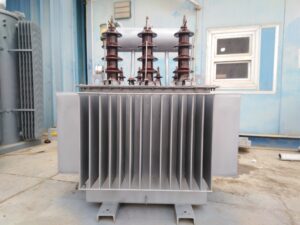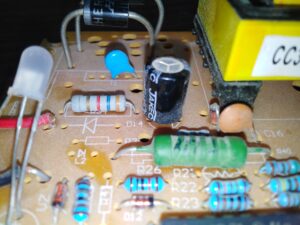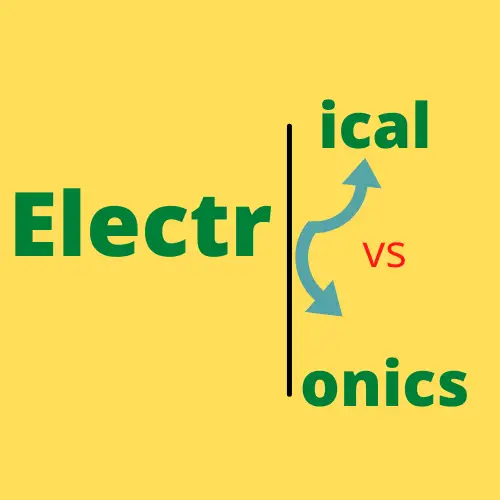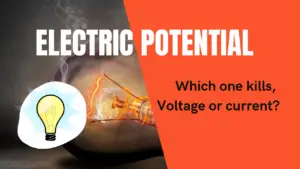Table of Contents
What is electrical engineering?
Electrical engineering is a branch of engineering that focuses on the study, design, application, and management of systems and devices that involve the use of electricity, electronics, and electromagnetism.
Electrical engineers work with electrical and electronic systems to develop, create, and maintain various technologies and infrastructure. Here are some key aspects of electrical engineering:
Electrical engineers should be able to design electrical circuits, and protection for electrical devices, lighting, and power systems. Also should be able to perform electrical maintenance and inspection for all electrical systems.
In essence, electrical engineering is a versatile field that spans a wide range of applications, from designing electrical systems that power our homes to developing advanced electronics that drive modern technology.
Electrical engineers are essential contributors to technological advancements and infrastructure development in our society.
How to be an electrical engineer?
Like all engineering branches, to become an electrical engineer you need to obtain an electrical engineering bachelor’s degree.
It’s clear that the answer to the question “How many years do you need to be an electrical engineer?”
Based on the country you are in. This may need 4 to 5 years to master this bachelor’s degree as a full-time student.
However, you shouldn’t stop learning, if you do you get left behind as the electrical engineering field improves rapidly.
Electrical Engineering Sub-fields
The electrical study has many sub-disciplines, below are the most common of them:
Power electrical engineering

Power electrical engineers deal with electricity generation, transmission, and distribution as well as many other design, protection, and operating electric motors, and transformers of different types.
That includes and is not limited to steam turbines, wind energy turbines, solar energy, and much more.
Control electrical engineers
Control engineers design, operate, and maintain control circuits that control machines, motors, generators, and almost every electrical energy working device.
Making control circuits needs controllers, and electrical and electronic elements such as contactors, relays, resistors, and photoresistors.
Electronics engineering

Electronics engineering mainly concerns electronics-based devices which are necessary for a wide range of applications.
These applications are unlimited as electronics are used in airspace devices, video games, mobile phones medical instruments, and a lot more.
Telecommunications engineering
Concerns with data transmission
Instrumentation engineers
Deal with measuring physical quantities devices. They should be able to design operate and maintain these devices.
What does an electrical engineer do?
Electrical engineers are professionals who work in various industries and play a crucial role in the design, development, installation, and maintenance of electrical systems and equipment.
Their responsibilities can vary depending on their specific job roles and the industry they work in, but here are some common tasks and activities that electrical engineers typically engage in:
-
Design and Analysis: Electrical engineers design electrical systems, circuits, and components. They use principles of mathematics and physics to create specifications and schematics for projects, ensuring that the systems they design meet safety, reliability, and performance standards.
-
Power Generation and Distribution: Some electrical engineers specialize in power generation, transmission, and distribution. They work on designing and maintaining electrical grids, power plants, and substations to ensure the efficient and reliable supply of electrical energy to consumers.
-
Electrical Machines: Electrical engineers may design and analyze electrical machines such as generators, transformers, electric motors, and alternators. They ensure these machines operate efficiently and safely, often in industrial settings.
-
Control Systems: They design and implement control systems to regulate the behavior of electrical systems and machines. These systems can be found in manufacturing, automation, and robotics, among other applications.
-
Electronics and Circuit Design: Some electrical engineers specialize in electronics engineering. They design electronic circuits and components, including integrated circuits (ICs), printed circuit boards (PCBs), and microcontrollers, for various applications such as consumer electronics, telecommunications, and medical devices.
-
Safety and Compliance: Ensuring safety is paramount in electrical engineering. Engineers must adhere to safety codes and regulations to protect people and property from electrical hazards. They also conduct safety assessments and risk analyses.
-
Testing and Troubleshooting: Electrical engineers conduct tests and experiments on electrical systems and components to verify their performance and identify issues. When problems arise, they use their expertise to diagnose and solve electrical and electronic malfunctions.
-
Project Management: Many electrical engineers are involved in project management, overseeing the planning, budgeting, scheduling, and execution of electrical projects. This includes coordinating with other professionals, such as architects and contractors.
-
Research and Development: Electrical engineers often work on research and development projects to create new technologies, improve existing ones, or solve specific technical challenges. This can involve innovative solutions in areas like renewable energy, wireless communication, and automation.
-
Environmental Considerations: In recent years, electrical engineers have become increasingly involved in sustainable and environmentally friendly practices. They may work on projects related to renewable energy, energy efficiency, and reducing environmental impact.
-
Documentation: Keeping thorough records, including technical drawings, reports, and documentation of project specifications and changes, is essential in electrical engineering to ensure accountability and future reference.
-
Continuing Education: Due to the rapidly evolving nature of technology and industry standards, electrical engineers often engage in continuous learning and professional development to stay updated on the latest advancements and trends in their field.
Overall, electrical engineers play a vital role in many industries, from energy and manufacturing to telecommunications and electronics, contributing to the design and operation of systems that power our modern world.
Their work is crucial for ensuring the safety, reliability, and efficiency of electrical systems and devices.
Is electrical engineering dangerous?
Electrical engineering, like many other professions, can involve potentially dangerous aspects depending on the specific tasks and situations involved. However, electrical engineers are trained to work safely and are well-aware of the hazards associated with electrical systems. Safety measures and regulations are in place to minimize the risks associated with electrical engineering work. Here are some aspects to consider regarding the potential dangers in electrical engineering:
-
Electrical Shock: Electrical engineers work with electricity, which can pose a risk of electric shock. Exposure to electric currents can be dangerous and even fatal. Electrical engineers are trained to work with high voltage systems and are well-versed in safety protocols to prevent electrical shocks.
-
Arc Flash: Arc flashes are sudden, explosive discharges of electrical energy that can occur in electrical systems when there is a fault or short circuit. These can produce intense heat, light, and pressure, causing severe burns and injuries. Proper protective gear, safe work practices, and equipment maintenance are essential to prevent arc flash incidents.
-
Fire Hazards: Electrical equipment and systems can generate heat and sparks, potentially leading to electrical fires. Electrical engineers must design systems and equipment with fire safety in mind, and they should be familiar with fire prevention measures.
-
Chemical Hazards: In certain industries, electrical engineers may work with chemicals used in battery manufacturing, semiconductor fabrication, or other processes. These chemicals can present chemical hazards if not handled properly.
-
Working at Heights: Electrical engineers may need to work at heights when installing or maintaining electrical equipment on utility poles, transmission towers, or in industrial settings. Proper fall protection measures are essential in such situations.
-
Environmental Hazards: Some electrical engineering tasks, especially those related to power generation and distribution, may involve working in adverse environmental conditions, such as extreme temperatures, adverse weather, or exposure to hazardous materials.
-
Equipment Hazards: Electrical engineers work with a variety of equipment, including machinery with moving parts. Proper training and safety procedures are necessary to prevent accidents related to equipment operation.
-
Radiation Exposure: In certain applications, such as in nuclear power plants or medical imaging facilities, electrical engineers may encounter ionizing radiation. Safety measures and protective gear are essential to minimize radiation exposure.
To mitigate these dangers, electrical engineers follow safety protocols, wear appropriate personal protective equipment (PPE), receive training on safe work practices, and adhere to industry-specific safety standards and regulations.
Employers and organizations also have a responsibility to create safe working environments for electrical engineers by implementing safety policies, conducting safety assessments, and providing necessary safety training.
While electrical engineering can involve potential hazards, with the proper precautions and adherence to safety guidelines, the risks associated with this profession can be effectively managed to ensure the safety of both engineers and those who interact with electrical systems.
What industries do electrical engineers work in?
Electrical engineers work in a wide range of industries due to the broad applicability of their skills and knowledge related to electrical systems and electronics. Here are some of the industries in which electrical engineers commonly find employment:
-
Power Generation and Distribution: Electrical engineers in this industry design, operate, and maintain power plants, electrical grids, and distribution systems. They ensure a reliable supply of electrical energy to homes, businesses, and industries.
-
Renewable Energy: With a growing emphasis on sustainability, electrical engineers work in renewable energy sectors such as solar, wind, hydroelectric, and geothermal power. They design and optimize systems to harness clean and renewable energy sources.
-
Electronics Manufacturing: Many electrical engineers work in the electronics manufacturing industry, where they design and produce electronic components, consumer electronics, and communication devices.
-
Telecommunications: Electrical engineers play a vital role in developing and maintaining telecommunications networks, including wired and wireless communication systems, satellite communication, and data transmission technologies.
-
Information Technology (IT): In the IT industry, electrical engineers are involved in the design and maintenance of data centers, networking infrastructure, and server systems. They also work on hardware and software integration.
-
Aerospace and Defense: Electrical engineers in the aerospace and defense sector design avionics systems, radar systems, communication systems, and electronic warfare equipment for military and civilian aircraft and spacecraft.
-
Automotive Industry: Electrical engineers work on designing and integrating electrical and electronic systems in automobiles. This includes everything from engine control units to infotainment systems and advanced driver-assistance systems (ADAS).
-
Manufacturing and Automation: Electrical engineers design and maintain control systems for manufacturing processes, industrial automation, robotics, and quality control systems.
-
Healthcare: In the healthcare industry, electrical engineers are involved in designing medical devices, imaging equipment (e.g., MRI machines, X-ray machines), and healthcare IT systems.
-
Oil and Gas: Electrical engineers in the oil and gas sector work on electrical systems related to exploration, drilling, extraction, and refining processes. They also design safety systems for hazardous environments.
-
Construction and Building Services: Electrical engineers design electrical systems for buildings, including lighting, power distribution, and fire alarm systems. They ensure that buildings meet electrical safety codes and energy efficiency standards.
-
Research and Development: Many electrical engineers work in research and development, either in academia or in private research institutions. They conduct experiments, innovate, and develop new technologies.
-
Environmental and Sustainability: Some electrical engineers focus on energy efficiency, renewable energy, and sustainability projects, working to reduce the environmental impact of electrical systems and technologies.
-
Consulting: Electrical engineers often work as consultants, providing expertise to various industries on electrical system design, safety, and compliance with regulations.
-
Entertainment and Media: In the entertainment industry, electrical engineers contribute to the design and operation of lighting, sound systems, and audiovisual equipment for concerts, theaters, and film production.
These are just a few examples of the diverse industries in which electrical engineers can find employment. The skills and knowledge of electrical engineers are essential in powering and advancing modern technology and infrastructure in numerous fields.
How hard is electrical engineering?
Electrical engineering, like any engineering discipline, can be challenging, but the level of difficulty can vary from person to person based on their individual aptitude, dedication, and prior background in the subject.
Here are some factors to consider when assessing the difficulty of electrical engineering:
- Math and Science: Electrical engineering relies heavily on mathematics and physics principles. You’ll need a strong foundation in calculus, differential equations, linear algebra, and physics. If you struggle with these subjects, you may find electrical engineering more challenging.
- Complexity: Electrical engineering involves complex concepts, especially in areas like circuit analysis, control systems, and electromagnetic theory. These topics can be challenging to grasp and require a deep understanding of underlying principles.
- Problem-Solving: Electrical engineers are often tasked with solving complex problems related to electrical systems and electronics. Problem-solving skills are essential and require the ability to apply theoretical knowledge to real-world scenarios.
- Laboratory Work: Practical applications are a significant part of electrical engineering education. This can include hands-on experiments and projects, which may be challenging for some students.
- Programming: Depending on your specialization within electrical engineering, you may need to learn programming languages like C, C++, or MATLAB. Programming can be challenging for those who are not familiar with coding.
- Advanced Topics: As you progress in your electrical engineering studies, you’ll encounter advanced topics like signal processing, digital systems, and semiconductor physics, which can be intellectually demanding.
- Time and Workload: Electrical engineering programs typically require a significant amount of coursework, which can be time-consuming. Balancing assignments, labs, and exams can be challenging.
- Teamwork: Many electrical engineering projects involve collaboration with teammates, which can add complexity to the work. Effective teamwork and communication skills are essential.
- Continuous Learning: The field of electrical engineering is constantly evolving due to technological advancements. Engineers need to engage in lifelong learning to stay current with new technologies and methodologies.
Despite these challenges, many individuals find electrical engineering to be a rewarding and fulfilling field. The sense of accomplishment from solving complex problems and contributing to technological advancements can make the effort worthwhile.
To succeed in electrical engineering, it’s essential to stay committed, seek help when needed, and make use of available resources such as professors, tutors, and study groups.
Developing good study habits and time management skills can also help in managing the workload and challenges associated with the field.
Remember that while electrical engineering can be demanding, it offers numerous career opportunities and the chance to work on exciting and innovative projects.
Is becoming an electrical engineer worth it?
Yes, it is worth the effort and the hard study to be an electrical engineer. This engineering field is exciting and lets you know how things work.
Regarding electrical engineer salaries in the USA, according to the Indeed site, the average yearly salary is about 92,3000 USD.
However, the salary can vary depending on the years of experience, the city, and the company you work for.
On the other hand, electrical engineering work opportunities are in almost all industries. However, if money is the only motivation for you to join the electrical engineering program, I recommend you find another higher-paying field.
Is Electrical Engineering a Dying Field?
Electrical engineering is an incredibly expansive field with far-reaching applications in various industries. It’s challenging to find a sector where electrical engineering isn’t influential.
As technology advances, the role of electrical engineers continues to grow and diversify. Let’s explore some areas where electrical engineers play a crucial role and highlight the evolving opportunities in this field.
Consider your surroundings: electrical engineering is ubiquitous. From the lighting in your home to the communication devices you use, electrical engineering underpins it all.
Indeed, electrical engineering is a field in constant evolution. To succeed in this dynamic environment, it’s essential to continuously expand your knowledge and refine your skills.
For recent graduates, my advice is to seek job opportunities that offer rapid skill development and exposure to cutting-edge technologies.
Embracing the ongoing changes in the field will not only secure a promising career but also contribute to shaping a sustainable and technologically advanced future.
Is electrical engineering a stressful job?
Yes, some electrical faults are hidden enough that we can’t even understand what is going on. But this is not the only rule of being an electrical engineer.
The point is, with more and more experience you can troubleshoot faults faster. And the more faults and issues you face and solve the more comfortable you feel with the feature faults.
One of the rules of electrical engineering is, that electrical faults are easy to fix but hard to be discovered. Imagine a large machine with many electrical control wires and cables. If one main wire gets damaged, the machine may stop.
Fixing the wire is just to repair a small portion of the wire and you are done. However, it may take hours to detect the damaged cable and its location.
Another example, In my work we have a very long overhead power line. Sometimes we get reports that the power is off in some locations.
We may spend up to 4 hours searching the OHTL network to find a blown fuse, cut wire, or a broken insulator. After 4 hours of searching, we just need 15 minutes to replace the blown fuse and we are done. You can imagine the stress we face in these 4 hours.
Difference Between Electrical and Electronics Engineering

Electrical engineering and electronics engineering are closely related disciplines within the field of electrical engineering, but they have distinct focuses and areas of expertise. Here are the key differences between electrical and electronics engineering:
- Scope of Study:
- Electrical Engineering: Electrical engineering primarily deals with the generation, distribution, and utilization of electrical power. It encompasses a broader range of topics, including power systems, electromagnetism, electric circuits, motors, and transformers.
- Electronics Engineering: Electronics engineering, on the other hand, is focused on electronic circuits and devices. It deals with the design, analysis, and application of electronic components like transistors, diodes, integrated circuits, and microprocessors.
- Applications:
- Electrical Engineering: Electrical engineers often work on systems related to power generation, transmission, and distribution. They design electrical systems for buildings, power plants, and infrastructure projects. They may also be involved in control systems and automation.
- Electronics Engineering: Electronics engineers specialize in electronic systems and devices. They work in areas such as telecommunications, consumer electronics, computer hardware, and embedded systems. They design and develop electronic circuits and devices that process and transmit information.
- Scale:
- Electrical Engineering: Electrical engineering tends to deal with larger-scale systems and higher voltages, such as those found in power grids and industrial facilities.
- Electronics Engineering: Electronics engineering focuses on smaller-scale systems and lower voltages, commonly associated with electronic devices and circuits.
- Components:
- Electrical Engineering: Electrical engineers work with components like generators, transformers, motors, and high-voltage equipment.
- Electronics Engineering: Electronics engineers work with semiconductor devices, integrated circuits, microcontrollers, and sensors.
- Core Skills:
- Electrical Engineering: Electrical engineers often need a strong foundation in power systems, electromagnetism, and control theory.
- Electronics Engineering: Electronics engineers require expertise in electronic circuit design, digital and analog electronics, and signal processing.
- Examples of Projects:
- Electrical Engineering: Designing the electrical system for a new building, optimizing the power distribution in an industrial facility, or working on a smart grid project.
- Electronics Engineering: Developing a new smartphone, designing a printed circuit board (PCB) for a medical device, or creating a microcontroller-based control system for an automotive application.
While these differences exist, it’s important to note that there is an overlap between the two disciplines, and engineers in both fields may collaborate on projects that require a combination of electrical and electronic expertise. Additionally, both fields are evolving with advances in technology, leading to further convergence in some areas.

How to be a professional electrical engineer?
Becoming a professional electrical engineer involves a combination of education, practical experience, and ongoing learning. Here are the steps you can follow to become a professional electrical engineer:
- Educational Requirements:
- Bachelor’s Degree: Start by earning a bachelor’s degree in electrical engineering or a closely related field from an accredited university. Your coursework will cover fundamental topics in electrical engineering, including circuits, electronics, electromagnetics, and digital systems.
- Gain Practical Experience:
- Internships and Co-op Programs: Seek internships or co-op opportunities during your undergraduate studies. These experiences provide valuable hands-on experience and insights into the real-world applications of electrical engineering concepts.
- Entry-Level Positions: After graduating, look for entry-level positions in electrical engineering, such as electrical engineer, assistant engineer, or electrical technician. These roles will allow you to apply your knowledge in a professional setting.
- Licensing and Certification:
- EIT/FE Exam: In many countries, including the United States, aspiring electrical engineers are required to pass the Engineer-in-Training (EIT) or Fundamentals of Engineering (FE) exam. Passing this exam is the first step toward becoming a licensed professional engineer (PE).
- PE License: After gaining several years of professional experience (typically around four years), you can apply to take the Professional Engineer (PE) exam. Becoming a licensed PE allows you to offer engineering services to the public, sign off on engineering plans, and take on more significant responsibilities in your career.
- Continuing Education:
- Electrical engineering is a rapidly evolving field. To stay current, consider pursuing advanced degrees (such as a master’s or Ph.D.) or enrolling in continuing education courses and workshops. Many professional organizations and universities offer online courses for engineers looking to expand their knowledge and skills.
- Specialize and Gain Expertise:
- Consider specializing in a particular area of electrical engineering, such as power systems, electronics, telecommunications, control systems, or renewable energy. Building expertise in a specific niche can open up more opportunities in your career.
- Join Professional Organizations:
- Join engineering societies and organizations such as the IEEE (Institute of Electrical and Electronics Engineers) to network with other professionals, access resources, and stay updated on industry trends.
- Stay Informed and Innovate:
- Keep abreast of the latest developments in electrical engineering by reading journals, attending conferences, and engaging in continuous learning. Innovation and adaptability are key in this field.
- Ethical Practice:
- Maintain high ethical standards in your work, following engineering codes of ethics and guidelines. Ethical conduct is fundamental to being a professional engineer.
- Communication and Soft Skills:
- Develop strong communication and interpersonal skills. Engineers often work in teams and need to effectively communicate their ideas and solutions to colleagues and clients.
- Pursue Career Advancement:
- As you gain experience and expertise, seek opportunities for career advancement, such as project management roles or leadership positions within your organization or in the industry.
Becoming a professional electrical engineer requires dedication, continuous learning, and a commitment to upholding engineering standards and ethics. It’s a rewarding career that offers opportunities to make significant contributions to society through technological advancements and innovation.
Install my Free Android App on Google Play:
Electrical Cables Most Common Tables
And, my Electrical Calculations App “”
Discover more great content by subscribing to My channel
Looking to stay ahead of the game in the world of electrical engineering? Subscribe to my YouTube channel and gain access to exclusive content you won’t find anywhere else!
The staff I recommend
(Amazon Affiliate Links to products I believe are high quality):
- Economy 120 Volt/60Hz AC Power Source – Step-Down Voltage & Frequency Converters 1800W
- UNI-T Digital Multimeter Tester UT139C
- 50-Amp Extension Cord for RV “100ft”
- Voltage Stabilizer 110/220v
- Hair Dryer “best selling“
- TOSHIBA EM131A5C-BS Countertop Microwave Ovens
Disclaimer: This contains affiliate links to Amazon products. I may earn a commission for purchases made through these links.




